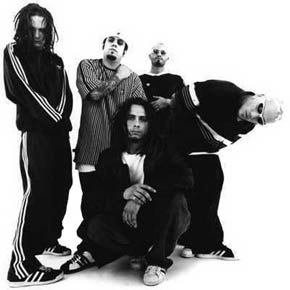Post by Taxigirl on Oct 23, 2003 11:26:17 GMT

Musical revolutions can foment in the oddest places: Athens, Georgia. Aberdeen, Washington. Bakersfield, California.
That's right, Bakersfield; a bleak, arid little town just west of Death Valley that could double as a David Lynch movie set-if there were anything going on, that is. As a kid Fieldy Arvizu spent much of his adolescence "standing around in dirt fields, drinking beer, watching other kids fight." At some point, Fieldy and some friends decided their time would be better spent taking out their frustrations on musical instruments instead.
And rock music would never be the same.
So Fieldy, James "Munky" Shaffer, David Silveria, Brian "Head" Welch, and eventually, an assistant coroner with a troubled past named Jonathan Davis left Bakersfield for Los Angeles and collectively became known as KORN. It helped that they all had common influences--the angry, urban stylings of hip-hop, the heavy, riff-driven angst of death metal. But the sounds emanating from this band's Huntington Beach rehearsal space would soon set an entirely fresh musical precedent--and set off a wave of imitators that eventually threatened to engulf the band itself.

After touring for nearly two years, KORN was signed by Immortal and released their now-classic eponymous 1994 debut. KORN opened with the prophetic, gravel-throated challenge "Are you ready?!" before kicking into the heaviest guitar sound yet heard in rock thanks to the team of Shaffer and Welch, who tuned their already-low 7-string guitars even lower and played with no regard for traditional harmonic consonance. The sound was metallic sludge, but tempered oddly by bassist Fieldy and drummer Silveria, who added a mix of porn-soundtrack funk and hip-hop rhythms that was puzzlingly aggressive and chill. Next, nursery-rhyme-like melodies were woven into the dark mix, helping make KORN the creepiest, heaviest debut since Black Sabbath. But Davis had no desire to sing about devils and witches; he was busy exorcising real-life demons. Songs such as "Faget" and "Shoots and Ladders" were discomfortingly personal confessionals of shattered childhood, and by album's end Davis was literally in tears in the harrowing "Daddy."
"Are you ready?!" Well, commercial radio sure wasn't. And neither was MTV. Not yet, anyway.
So KORN took their grisly show on the road someplace they knew it'd get noticed: back to the tour circuit, and a stint on Ozzfest. The band's unique sound may have been unfamiliar, but the kids knew it rocked mightily-and many of them could directly relate to Davis' grim lyrical obsessions. At that point in time, there was quite simply no band on earth like KORN.
And so they began to amass a following that would send their next album, 1996's brutal yet cheekily titled Life is Peachy, into platinum sales. And this time at least the press was ready. "...Perverts, psychopaths and paranoiacs" gushed the Chicago Tribune. "An ingeniously twisted piece of personal hell" raved Cleveland's Plain Dealer.

And while Peachy served more to reinforce the band's core sound rather than innovate in the manner of the debut, it did introduce to the world to a side of the band no one ever suspected existed: humor. The bagpipe-driven cover version of War's "Lowrider" was just one example. An A-Z dictionary of vulgarity called "K@#%!" was another-though some critics and self-appointed moral guardians were put off by the language. One Zeeland, Michigan high school administrator told the press that KORN was "indecent, vulgar, and obscene" shortly after suspending a student for wearing a T-shirt that merely said "KORN." After the band filed a cease-and-desist order against the school on behalf of the student, he was reinstated. But the episode marks yet another milestone for the band: it was the first of many times the band would go to bat for its fans.
Years of touring followed again as the band fortified its fan-base to the degree that their next album, 1998's Follow the Leader, would debut at No. 1 on Billboard's Top 200. The band charted two bona fide singles with "Got the Life" and "Freak on a Leash," while the album's actual "rap-metal" tracks ("Children of the KORN" with guest rapper Ice Cube, and "All in the Family" with guest abuser Fred Durst) were some of the band's hardest-hitting to date, and reaffirmed their status as the band by which others would be judged in this genre.
Others seemed to agree. Rolling Stone christened Follow the Leader one of the best alternative albums of the '90s, praising KORN's ability to channel "their disgust with the state of the nation--and the generation doomed to inherit it--into booming, articulate violence."
Booming, articulate violence aside, Follow the Leader exposed yet another side of KORN.






